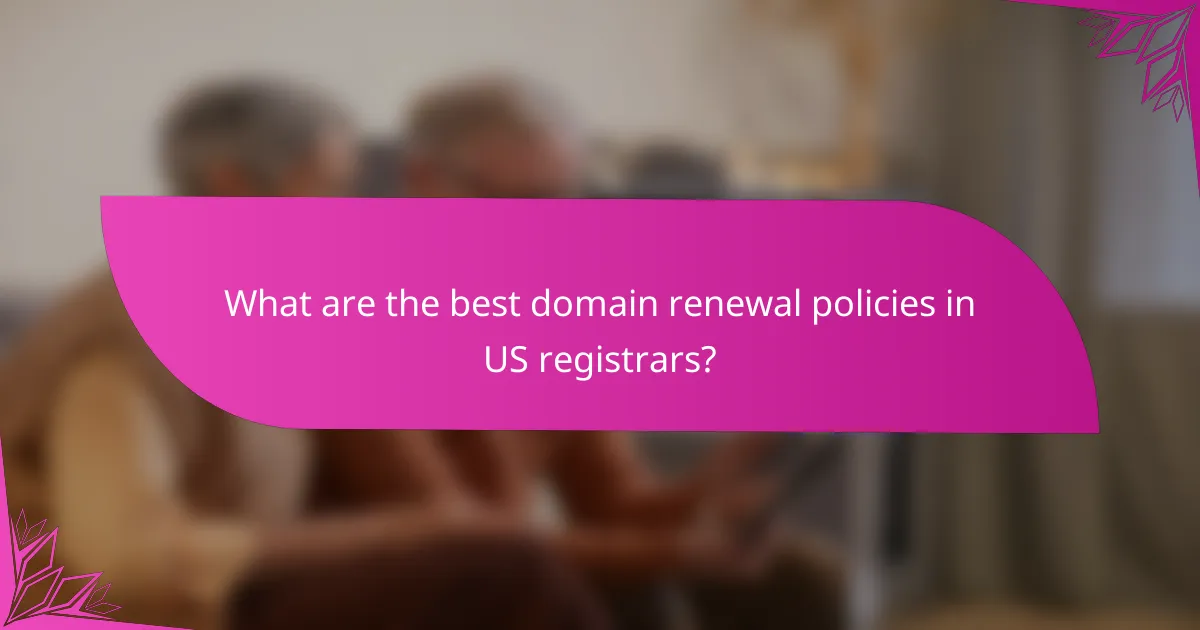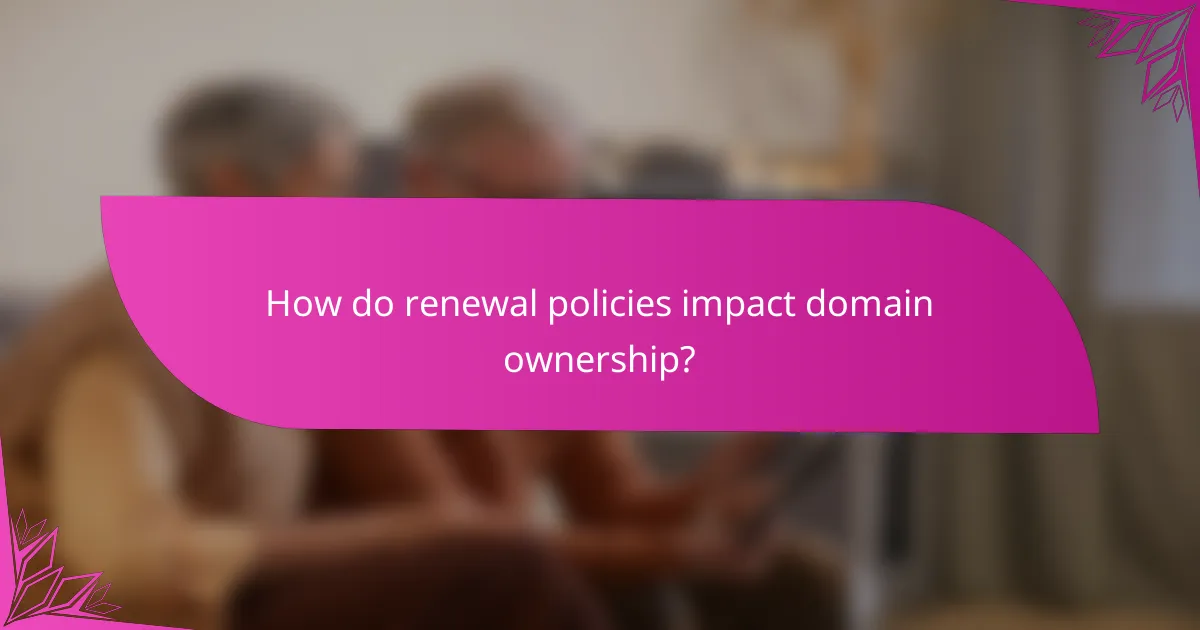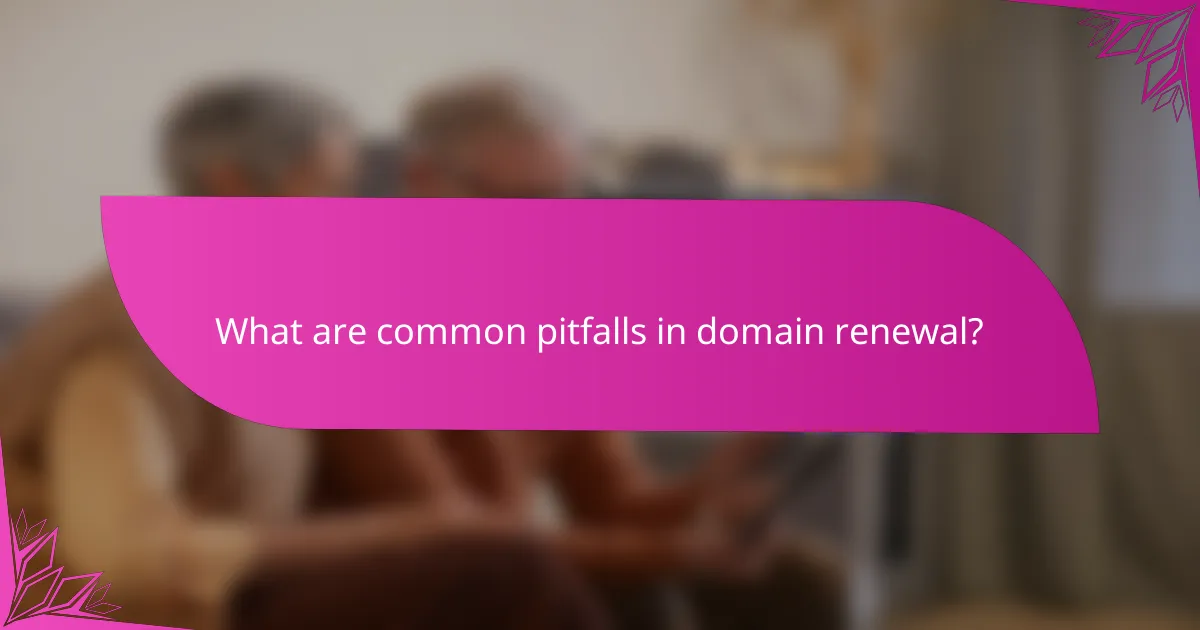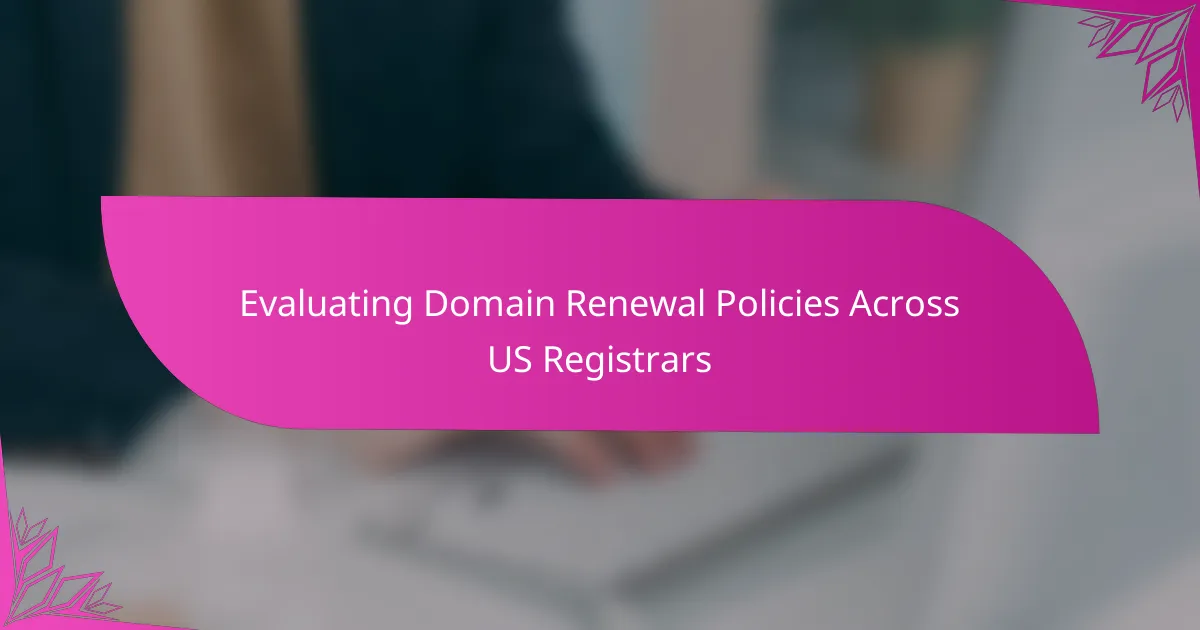Evaluating domain renewal policies across US registrars is essential for domain owners seeking to maintain control over their online presence. With significant variations in renewal rates, grace periods, and auto-renewal practices, understanding these policies can help avoid unexpected fees and ensure uninterrupted ownership. Additionally, factors like customer support and transfer policies play a crucial role in the overall management experience.

What are the best domain renewal policies in US registrars?
The best domain renewal policies among US registrars typically offer competitive pricing, transparent terms, and user-friendly management options. Key factors to consider include renewal rates, grace periods, and auto-renewal features, which can significantly impact your domain management experience.
Namecheap renewal policy
Namecheap provides a straightforward renewal policy with competitive pricing for domain renewals. Users can expect to pay similar rates to their initial registration, often in the range of $10 to $15 per year, depending on the domain extension.
One notable feature is the auto-renewal option, which can be enabled to prevent accidental expiration. However, users should ensure their payment information is up to date to avoid any interruptions.
GoDaddy renewal policy
GoDaddy’s renewal policy is known for its extensive range of services, but renewal prices can be higher than some competitors, often between $15 and $20 per year. It’s crucial to check the renewal rate before registering, as promotional prices may not apply after the first year.
GoDaddy offers a 30-day grace period for expired domains, allowing users to recover their domains without incurring additional fees. However, be cautious with their auto-renewal settings to avoid unexpected charges.
Bluehost renewal policy
Bluehost’s renewal policy is primarily tied to its web hosting services, with domain renewals typically priced around $15 per year. Users who purchase a hosting plan may receive a free domain for the first year, but renewal rates should be confirmed as they can vary.
Bluehost also provides an auto-renewal feature, which is beneficial for maintaining ownership. Users should monitor their account settings to ensure they are aware of upcoming charges.
HostGator renewal policy
HostGator offers domain renewals at competitive rates, generally around $15 per year. Similar to Bluehost, users often receive a free domain for the first year with a hosting plan, but renewal prices can differ, so checking the terms is advisable.
HostGator includes an auto-renewal option, which helps prevent domain loss. Users should verify their payment details and renewal settings to avoid any lapses in domain ownership.
Google Domains renewal policy
Google Domains has a clear and transparent renewal policy with prices typically ranging from $12 to $20 per year, depending on the domain extension. The renewal process is straightforward, and users can manage their domains easily through their Google account.
Google Domains does not automatically renew domains unless users opt for this feature, so it’s essential to keep track of renewal dates. Users can receive notifications before expiration, helping to prevent any loss of domain ownership.

How do renewal policies vary among US registrars?
Renewal policies among US registrars can differ significantly, impacting costs, grace periods, and auto-renewal practices. Understanding these variations is crucial for domain owners to avoid unexpected fees and ensure continuous ownership.
Price differences
Price variations for domain renewals can range from low tens of dollars to significantly higher amounts, depending on the registrar and the domain extension. Some registrars may offer competitive rates for renewals, while others might charge premium prices, especially for popular domain endings like .com or .net.
It’s essential to compare renewal prices before selecting a registrar. Some may offer discounts for the first year but have higher renewal rates, so consider the long-term costs when making your choice.
Grace periods
Grace periods refer to the time allowed after a domain’s expiration during which the owner can still renew without losing the domain. Most US registrars provide a grace period ranging from a few days to several weeks.
During this grace period, the domain is typically still accessible, but fees may apply. Be aware that after the grace period, domains may enter a redemption period, which can incur additional costs and complications for recovery.
Auto-renewal options
Many registrars offer auto-renewal options that automatically renew your domain before it expires, helping to prevent unintentional loss. This feature is often customizable, allowing you to set notifications or choose specific domains for auto-renewal.
However, it’s important to monitor your payment methods and ensure they are up-to-date, as failed transactions can lead to domain expiration. Review the registrar’s policies on auto-renewal to understand any associated fees or conditions.

What factors should you consider when choosing a registrar?
When selecting a domain registrar, consider factors such as customer support quality, transfer policies, and additional services offered. These elements can significantly impact your experience and the management of your domain.
Customer support quality
Customer support quality is crucial when choosing a registrar, as you may need assistance with domain management or troubleshooting. Look for registrars that offer 24/7 support through various channels, including phone, email, and live chat.
Read reviews and testimonials to gauge the responsiveness and helpfulness of their support team. A registrar with strong customer support can save you time and frustration during critical situations.
Transfer policies
Transfer policies dictate how easily you can move your domain to another registrar. Check if the registrar imposes any transfer fees or waiting periods, as some may require you to keep the domain for a certain duration before transferring.
Also, verify if they offer an easy transfer process. A registrar with straightforward transfer policies can provide flexibility in managing your domains as your needs change.
Additional services offered
Many registrars provide additional services that can enhance your domain management experience. These may include web hosting, email hosting, SSL certificates, and website builders.
Consider what services you may need in the future and choose a registrar that offers a comprehensive suite of tools. Bundling services can often lead to cost savings and a more streamlined management process.

How do renewal policies impact domain ownership?
Renewal policies significantly influence domain ownership by dictating how and when a domain can be retained. Understanding these policies helps owners avoid unexpected losses and ensures continuity of their online presence.
Risk of losing domain
Failure to adhere to renewal policies can lead to the loss of a domain. Most registrars offer a grace period after the expiration date, typically ranging from a few days to several weeks, during which the owner can renew the domain without penalty. After this period, the domain may enter a redemption phase, which often incurs additional fees.
To mitigate the risk of losing a domain, set reminders for renewal dates well in advance. Consider enabling auto-renewal features if available, but ensure that your payment information is always up to date to avoid lapses.
Impact on SEO
Domain renewal policies can affect search engine optimization (SEO) by influencing site availability. If a domain expires and becomes inaccessible, it can lead to a drop in search rankings due to broken links and reduced traffic. Search engines prioritize active domains, so maintaining ownership is crucial for sustaining SEO efforts.
To protect your SEO standing, regularly monitor your domain’s renewal status and consider using tools that alert you of upcoming expiration dates. Additionally, keep your website content fresh and relevant to help maintain its visibility in search results.

What are common pitfalls in domain renewal?
Common pitfalls in domain renewal include overlooking renewal notices and misunderstanding auto-renew settings. These issues can lead to unintended domain expirations, resulting in loss of ownership or website downtime.
Ignoring renewal notices
Many registrars send multiple renewal notices via email as the expiration date approaches. Ignoring these notices can result in a domain expiring unexpectedly, which may lead to losing the domain altogether or incurring additional fees to reclaim it.
To avoid this pitfall, set reminders on your calendar a few weeks before the renewal date. This proactive approach ensures you have time to review your renewal options and make necessary payments.
Not understanding auto-renew settings
Auto-renew settings can vary significantly between registrars, and not understanding them can lead to confusion. Some registrars automatically renew domains unless you opt-out, while others require explicit consent for each renewal.
Check your registrar’s auto-renew policy and ensure your payment information is up-to-date. If you prefer manual renewals, disable the auto-renew feature to avoid unexpected charges. Regularly review your domain portfolio to confirm that all settings align with your preferences.
